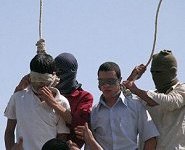
Thursday, February 16, 2006
New Government Fails to Address Human Rights
February 16, 2006 Amnesty International Press Release
Six months after Iran's new president came to power human rights violations remain widespread and the new government has failed to take any action to address the situation, Amnesty International revealed in a report published today. "The Iranian government should take concrete steps to improve the human rights situation in the country," said Amnesty International. "The current standoff regarding the country's nuclear programme must not distract either the government or the international community from addressing the country's long-standing human rights problems." The report Iran: New Government Fails to Address Dire Human Rights Situation describes ongoing violations and expresses concern about what appears to be intensifying repression since the new government took office in August 2005. The report focuses on the long-standing repression of ethnic minorities and the limitations on the freedom of expression. It also addresses the death penalty and the frequent use of torture. Despite constitutional guarantees of equality, the report establishes that since President Ahmadinejad's election, members of Iran's ethnic and religious minorities have been killed, detained or harassed solely in connection with their ethnicity or faith. In one incident, several members of the Ahwazi Arab community were killed and scores injured by security forces using excessive force during ongoing violent unrest in Khuzestan Province. In a different incident, Iranian security forces were reported to have used live ammunition, tear gas and beatings with batons to suppress stone-throwing demonstrators in mid-September 2005. At least two people were reported killed and many injured. Iranian legislation severely restricts freedom of expression and association and human rights activists often face reprisals for their work. Harassment, intimidation, attacks, detention, imprisonment and torture of activists and journalists have continued under the new government. In October 2005, Press Courts were reintroduced to try alleged breaches of the Press Code, which contains vaguely-worded provisions that can be used to punish people for the peaceful expression of their opinions. Dozens of journalists and newspapers began to be examined with some journalists receiving suspended prison sentences. "We urge the Iranian authorities to review law and practice to ensure that no one is imprisoned as a prisoner of conscience or discriminated against solely on account of their political opinions, race, ethnicity, gender, sexuality or language," said Amnesty International. Amnesty International has continued to receive new reports of torture and ill-treatment of detainees which remain routine in many prisons and detention centres. Denial of medical treatment as a method to exerting pressure on political prisoners has also emerged as an increasingly common occurrence, as in the case of investigative reporter Akbar Ganji. Akbar Ganji was arrested in April 2000 and sentenced to 10 years' imprisonment, which was reduced on appeal to six months, for "taking part in an offence against national security" and "propaganda against the Islamic system". In July 2001 he was again brought to trial on charges of "collecting confidential state documents to jeopardize state security" and "spreading propaganda", and was sentenced to six years’ imprisonment. Following a hunger strike in protest at being denied independent medical treatment outside prison, he was temporarily released for medical treatment in July 2005. He was returned to prison in September 2005 and placed in solitary confinement. A month later he told his wife that he had been beaten by security forces while in hospital prior to his return to prison. "The Iranian authorities must conduct investigations into all allegations of torture or ill-treatment, and take effective measures to bring anyone implicated in human rights violations to justice," said Amnesty International. "Urgent and effective measures are also needed to ensure that the use of torture is eradicated once and for all." Amnesty International recorded 69 executions between July 2005 and the end of January 2006, including two of youths reportedly under 18 at the time of their execution. Death sentences continue to be imposed for vaguely worded charges such as "corruption on earth", for consensual private adult sexual relations and for other offences such as drinking alcohol, as well as for crimes such as rape, murder and drug-trafficking. The organization is asking the authorities to demonstrate their respect for the inherent right to life by ordering a moratorium on executions, and by taking immediate steps to prevent further executions of minors or persons who were under 18 at the time of their alleged crimes. "President Ahmadinejad and the Iranian govenrment need to take urgent, concrete measures to ensure that the fundamental human rights of all persons in Iran are protected irrespective of their gender, ethnicity and faith." Public Document **************************************** For more information please call Amnesty International's press office in London, UK, on +44 20 7413 5566 Amnesty International, 1 Easton St., London WC1X 0DW. web:
http://www.amnesty.org/ For latest human rights news view
http://news.amnesty.org/
# posted by Free_Iran_Now : Thursday, February 16, 2006

